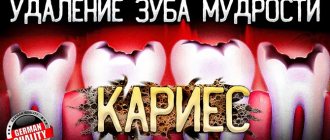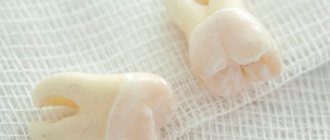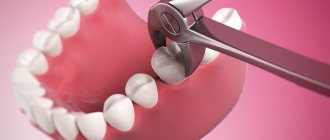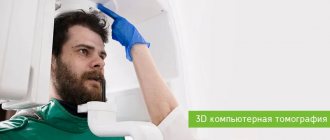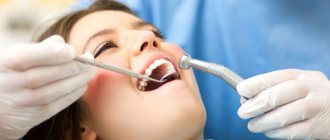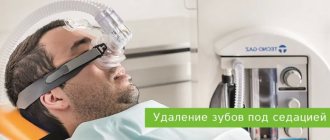Some people are only slightly nervous and experience slight discomfort before going to the dentist, while for others, just the thought of a dentist and dental instruments causes panic. Although in the modern world dentistry has long been absolutely safe and painless. In the latter case, we can talk about the development of dental phobia, as a result of which fear becomes irrational and uncontrollable. To understand how not to be afraid of the dentist, you first need to understand the reasons for this fear.
Where does fear of the dentist come from?
Each person's fear of dentists has its own reason, but the factors contributing to its occurrence are quite similar.
The oral cavity is one of the most sensitive areas in the body. Therefore, any medical procedures associated with the slightest intervention in this area cause a feeling of anxiety. And the person in the dental chair has a feeling of helplessness, giving rise to fear.
For many people, the fear of the dentist goes back to childhood. Memories associated with the dental office of the last century most often include a feeling of pain, inconvenience, resentment at the dentist’s harshness, and a nasty smell and taste. All this could not but lead to the emergence of a fear of the dentist, and subsequently to the development of a phobia.
Sometimes people are afraid of the dentist's reaction to the terrible condition of their teeth. Unfortunately, this fear is provoked by dentists who reprimand their patients too harshly for neglecting their health.
And the fear of visiting the dentist in children is often a reflection of the phobia of their parents. The child sees and feels how adults are afraid of the dentist, and he also becomes very scared.
Symptoms and causes
How to determine dental phobia? Signs.
Regardless of the form of dental phobia, the symptoms of the disease are almost identical:
- panic anxiety;
- reflex muscle tension;
- increased sweating;
- headache;
- increased heart rate when talking about the clinic and medical examination;
- spontaneous dilatation of the eye pupils;
- slight tremor of the arms and legs;
- blood pressure surges;
- state before fainting or fainting itself;
- disorder of internal organs, accompanied by intestinal colic, nausea, vomiting;
- uncontrolled movements and actions;
- aggression with its physical manifestation;
- refusal of any contact with the dentist.
Of course, the physical manifestations of the disease are characteristic of the active stage - when the patient comes face to face with his fear. Psychological signs usually appear at the peak stage when attempting to start therapy. In this case, the patient finds himself in a panic: he ceases to control his actions, becomes aggressive or, conversely, becomes numb. The clinical picture that appears in this way is the reaction of the human central nervous system to a stressful situation. If the patient is really sick, parts of the limbic system of the brain transmit one to another special signals that cause such manifestations.
What causes dental phobia?
The formation of dental phobia is due to a number of reasons, on the basis of which experts draw conclusions about the origin of the disease. Among the most common factors:
- own negative experience. The disease develops in response to trauma suffered in childhood, which is in one way or another connected with the dentist and dental treatment. The fear experienced by a person in childhood leaves its mark in the present;
- heredity. If one of the child’s parents is afraid of the dentist and drug interventions in general, this fear can be inherited. There is a particularly high risk of passing on maternal fear to a daughter;
- general emotional sensitivity. Stories from other people, watching videos and photographs of the process and results of dental treatment can cause a person to panic about the doctor;
- lack of attention. Closed or, conversely, overly active children who are deprived of care, showing fear, they attract the attention of others;
- low sensitivity threshold. This is a feature of the body that a person acutely feels during toothache, as well as with poor-quality pain relief or its complete absence;
- stereotypical thinking formed on the basis of the promoted image of a dentist on the Internet, on TV, in social networks;
- increased sensitivity of oral tissues, leading to a subconscious expectation of severe pain;
- regularly occurring panic attacks due to a labile nervous system or hormonal imbalance;
- gag reflex at the sight of the dentist's working tools;
- irrational fear of contracting infections through dental instruments;
- previously experienced stress that has become chronic;
- mental illness;
- dysfunction of the central nervous system;
- feeling helpless in the dental chair;
- fear of blood;
- fear of doctor criticism;
- money factor.
When determining the main reasons for the development of dental phobia in adults, it was found that the majority of patients (about 70%) first experienced fear of the dentist in childhood.
Why is it dangerous to be afraid to treat and remove teeth?
Some people, not knowing how to overcome their fear of the dentist, prefer to endure toothache until the last moment, and go to the doctor only if it becomes unbearable. However, there are situations when such behavior becomes truly dangerous, especially if the pain is caused by the onset of some kind of inflammatory process.
So, with acute pulpitis or periodontitis, an infectious disease such as phlegmon can develop. This pathology poses a danger not only to human health, but also to his life.
Various infectious processes in the oral cavity can lead to inflammation of the lymph nodes - lymphadenitis, which, if left untreated, often leads to serious complications.
The presence of advanced caries, infection, periodontal disease and dental trauma often leads to abscesses, the main treatment for which is surgery. Without medical intervention, the disease is fatal.
In addition, caries slowly but surely destroys dental tissue, and if it is not treated, over time there will be no chance to save the tooth.
Therefore, for people who have no idea how to overcome their fear of the dentist, despite severe pain, it will be enough to simply assess the consequences of postponing a trip to the dentist.
Myth No. 2. As long as the wisdom tooth does not hurt, there is no need to remove it
It is worth clarifying here that indeed, not every wisdom tooth can be removed. There are clinical cases in which the third molars occupy the correct position in the oral cavity, effectively participate in the chewing process, and do not create problems for other teeth. Unfortunately, this is very rare.
In this article we are talking about those teeth that have already been recommended for removal by your dentist. And in this case, it is extremely undesirable to postpone going to the surgeon. I'll explain why.
A tooth located outside the dental arch (dystopic), impacted or semi-impacted (partially erupted tooth) is an area difficult to reach for cleaning. Over time, due to the accumulation of plaque, such a tooth will be destroyed, which will result in the development of an inflammatory process in the surrounding soft tissues and jaw bone. In other words, at the moment when you already feel anxiety in the tooth area, this will mean that the process of destruction has been going on for a long time. First of all, this is bad for the patient. Since the surgeon will cope with the emerging pathological process at this stage, however, you will have a longer treatment and rehabilitation period. It is possible that in a particularly advanced case, medical care will have to be received in a hospital setting at a maxillofacial surgery clinic. That is, it turns out that when treated as planned, the tooth can be removed at a time convenient for you, while maintaining good health and performance. If an inflammatory disease of the soft tissues (abscess or phlegmon) or jaw (periostitis or osteomyelitis) develops, the cause of which is a tooth that was not removed in time, you will have to stay in the hospital and undergo complex treatment.
I talked about the most dangerous scenario, since, in my opinion, the patient must have complete information in order to be able to make an informed and informed choice.
There are also less life-threatening, but no less unpleasant consequences of untimely removal of wisdom teeth.
The wisdom tooth can serve as a point to trap plaque and food debris. Thus, it will provoke the development of caries on neighboring teeth. In addition, the eruption of a wisdom tooth in the wrong position in the dentition can put pressure on adjacent teeth and change their position. As a result, problems with the bite and the condition of the temporomandibular joint will arise. At this stage, in addition to the removal of the wisdom tooth, it will be necessary to undergo treatment with an orthodontist, the goal of which will be to return the correct bite.
To summarize, I offer a number of recommendations, if followed, you will be able to solve the problem of wisdom tooth removal in a timely manner, without fear, health problems, unnecessary time and financial costs.
- If you do not know whether it is necessary for you to have your wisdom teeth removed, then be sure to ask your dentist this question at your next preventive examination.
- If your doctor has previously recommended that you have your wisdom tooth removed, do not delay your visit to a dental surgeon. If you are afraid to go straight for removal, then sign up for a consultation first. You will meet the doctor, ask all your questions, and plan the time to perform the surgical procedure. In the future, going to an appointment with a doctor you already know will be much calmer and more pleasant.
Tips on how to overcome your fear of dental treatment
How not to be afraid of the dentist? This question is asked by any person suffering from dental phobia, and the following tips can help him:
- In order not to be so afraid of the dentist, you can first make an appointment with him for a preliminary consultation. Nothing terrible will happen during it, and the patient will have the opportunity to get to know the attending physician, ask him all the necessary questions and, possibly, establish a trusting relationship with the dentist. In this case, it will be easier for the person to relax in the dentist's chair, and he will not be so afraid.
- Before the preliminary consultation, you should independently understand your fears so as not to forget to ask the doctor the most pressing questions. For example, if a person constantly thinks: “I’m afraid to have a tooth removed because the last time it was very painful,” it is precisely about the specifics of this procedure that you need to talk to the dentist about.
- You need to agree with your doctor that he will immediately stop the procedure if it suddenly becomes painful. Such a promise will help the patient gain confidence and peace of mind.
- If before any dental procedure the patient asks to be given anesthesia, his anxiety will immediately decrease.
- When choosing a dental clinic, it is better to give preference to one that is more like a sanatorium than a hospital, which causes unpleasant associations.
- In addition, a person who does not understand how to stop being afraid of the dentist will greatly benefit from the support of loved ones.
Main stages
Regardless of the indications, the tooth is removed in several stages:
- examination by a doctor, diagnostic procedures, medical history;
- anesthesia of nearby areas (carried out by injection into the gum of the anesthetic Ultracaine, Ubestezin, or others)
- ligamentotomy (detachment of the tooth itself from the gum);
- application of forceps, their gradual movement to the area under the gum and further fixation;
- tooth dislocation;
- direct removal of the element from the hole;
- inspection and treatment of the hole using antiseptics and other medications;
- suturing (carried out only if there is a large wound surface).
Usually, tooth extraction goes without problems, but in rare cases, some complications of the procedure itself are possible. This may be a root fracture, bleeding, soft tissue injury and other pathologies that are promptly corrected by a doctor.
If we are talking about removing a wisdom tooth that has not yet erupted but is growing incorrectly, then in this case an incision in the gum is necessary to extract it. In such a situation, the wound is quite deep and the gums take a little longer to heal after tooth extraction.
What to do if advice doesn’t help
If a person who has taken advantage of the proposed advice declares: “I’m still afraid to treat my teeth - what should I do,” then he can try to overcome his fear by resorting to sedation or general anesthesia.
The use of general anesthesia in dentistry is an alternative replacement for local anesthesia and is often used in the treatment of patients suffering from dental phobia. Such anesthesia implies a complete shutdown of consciousness and an absolute loss of sensitivity.
Xenon sedation is a cross between anesthesia and anesthesia, but in a state of medicated sleep the patient responds to the doctor’s verbal commands, for example, to a request to open his mouth. It should be noted that after sedation it is much easier for the patient to recover than after general anesthesia.
Of course, a person who previously had no idea how to overcome his fear of the dentist will not be able to completely get rid of it before his first visit to the doctor. But over time, the fear will definitely pass.
What to do after tooth extraction?
To prevent complications, immediately after tooth extraction, prophylaxis must be carried out several hours later. It consists of the following activities:
- Remove the gauze swab from the hole as it can cause infection;
- Apply ice to your cheek. This should be done a couple of times a day, but no longer than 5 minutes.
- Do not eat for 2-3 hours after tooth extraction.
- Avoid strenuous physical activity for several days.
- To prevent bleeding, do not take a hot bath for the first 24 hours.
- In the first days, avoid rough food.
- Rinse your mouth with chlorhexidine solution three times a day. This must be done very carefully so as not to remove the blood clot from the wound. Simply hold the solution in your mouth for a few seconds and then spit it out.
These rules must be followed after the removal of a wisdom tooth or any other tooth resection.
Sound background
In modern dentistry, it has become a practice that during a dental appointment, classical or calm music should be played in the office to calm the patient. But there is a misconception here. Not all patients like this type of music. The fact is that real people with their own preferences come to see us. Some people like Rock, others Rap, Folk, Punk, “Red Mold”, “Gas Sector”, Soviet pop music, etc. It is better to clarify your preferences before manipulation.
In one of his lectures, Alexey Vodovozov mentioned a study that found that during surgical procedures, the music that the surgeon likes is most effective. It reduces errors and complications, increasing concentration and quality of results.
In my opinion, it is best to reach a compromise here and choose the background that suits all participants in the process. It so happened that in my practice Rammstein often sounds. And even ladies of advanced age listen with pleasure. And at subsequent receptions they themselves ask to stage “that energetic German ensemble.”
Tooth extraction: price
Those who need extraction are unlikely to worry about the price, since a bad tooth causes a lot of discomfort. However, in this case, you don’t have to worry about the cost of the procedure, because almost everyone can afford it. The average price in large cities, including anesthesia, is approximately 1000-1500 rubles. This is completely inexpensive when compared, for example, with the treatment of pulpitis, which involves removing the nerve of the tooth and costs from 2,500 rubles. The indicated amount may differ depending on the class of the clinic and the professionalism of the doctor himself.
Psychological attitude
What to do when fear prevents you from visiting the clinic? The main thing is to prepare for the operation psychologically. You need to collect your thoughts, prepare yourself for tooth extraction, and recharge with positive emotions. After all, a positive attitude is considered the main aspect of successful radical intervention. For those who are subject to excessive anxiety, doctors recommend drinking motherwort or valerian 40-45 minutes before the procedure, but do not exceed the usual dosage.
The sooner the procedure takes place, the sooner you will feel calm. Remember, healing will be easier for those patients who sought help in time. Jaw and gum tissue will recover faster if the body is determined to eliminate the problem and speed up rehabilitation. It is necessary to understand that the affected unit is a hotbed of pathogenic bacteria. Any pain can reduce the quality of life and disrupt normal nutrition. In such a situation, the procedure for caring for the oral cavity becomes difficult, which disrupts the normal microflora. The most important thing is that the problem organ damages the neighboring teeth. Awareness of all this will help you prepare for tooth extraction. If you cannot do this on your own, you should seek help from a psychologist.
Experienced specialists use various techniques to eliminate fear, tightness, and reluctance to be treated. For the operation to be successful, the doctor needs to tell the patient in detail about the course of the procedure, why the manipulations used are necessary, and what kind of result is expected after the radical procedure. Molar tooth extraction is always performed under anesthesia. The dentist must explain to an unsure patient how pain relief works. Practice shows that positive and cheerful people tolerate extraction more easily than those who are not confident in themselves.
Experts' opinion
Question: After removing the root, the doctor told me to rinse my mouth. What means can be used for this?
Answer : Among the most accessible means for rinsing the mouth after tooth root removal are: a weak salt solution (you can use a mixture of salt and baking soda in equal proportions), miramistin, chlorhexidine, a weak solution of potassium permanganate (light pink), a decoction or infusion of medicinal products herbs (chamomile, sage, eucalyptus, calendula). Oak bark helps very well. It must be remembered that active rinsing cannot be carried out on the first day after surgery. During this period, you just need to put the product in your mouth and hold it for a few minutes, then spit it out.
Question: Is it possible to remove a tooth root yourself at home?
Answer : Doctors at the Optimal Choice dental clinics recommend that you never try to remove a tooth root at home on your own, but if you have the slightest problem with your teeth, visit a dentist as soon as possible. It is not worth saving on your health, since such savings may entail large expenses in the future. At home, it is not possible to painlessly, efficiently and correctly remove the root of a tooth using improvised means. This can only be done in a clinical setting.

